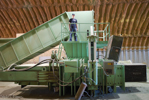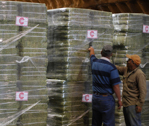About Triple C Farms
The Triple C Farm:
The farm has 21 irrigation wells, 25 pivot sprinklers, 7 hay barns, two hay processing buildings, a repair shop, three enclosed storage buildings, on site offices, on site employee housing, 8 grain storage units, full scales and loading docs.
In 2005, David and Mark began implementation of their plan to transform the farm into a tri-task company, with farming, hay processing, and exporting as its key focuses.
Optimizing Production:
The first production optimization steps taken to transform the farm were to implement a methodical monitoring of the individual field production. The process includes carefully monitoring the yield from each specific field on a crop by crop and harvest by harvest basis.
Next, they began a systematic implementation of soil upgrades and preservation. Within the first year of the transformation they began rotating crops, implementing soil supplementation via compost application, deep soil ripping, and most recently irrigation modifications.
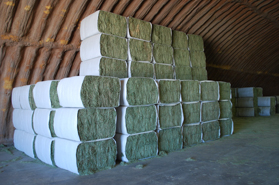
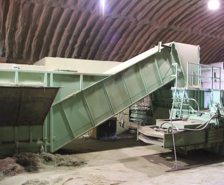
Hay storage barns are a common necessity of good hay management, but the Triple C managers have taken extra steps to insure the barns are effective. The Triple C has upgraded its barns, they built drain fields, gravel approaches, and have implemented a hay maintenance program to tarp the ends and sides and bottoms of the hay barns once the hay is stored.
The Triple C tests its hay and projects the yields and nutritional values the inventory has. Through strict moisture control and monitoring the Triple C produces and maintains a truly top quality hay inventory.
The Triple C has taken calculated steps to experiment with crops that are well suited to the soil, climate, and will fit into the export plan. The crops used to rotate must fit three criteria, first, the crop must hold the soil, second, the crop must not leave significant remnant, and third the crop must be exportable. Examples of the rotation crops are Sudan Grass, Tiffany Teff Grass, wheat and barely hay, and corn straw.
Optimize Business Growth through Exports:
The export of forage feeds requires processing. In the case of alfalfa and other forage feeds, pressing, or double compressing, is the method chosen by the Triple C.
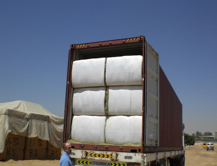
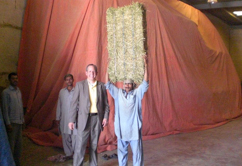
The year following the transformation they commissioned and installed a 30kg Cooper Double Press. They built new loading docks and they installed a staging area. In 2007 they purchased and installed a 450kg Cooper Double Press. In 2008 they refinished the roofs and upgraded both hay press buildings. The hay presses are state of the art and have the ability to run independent, which allows processing capacity.
Custom Feeds:
The Triple C produces a wide variety of custom livestock feeds. Please see the Products listing for a complete list of the custom feeds currently available.
Conclusion:
Going forward, the Triple C is well positioned to continue its growth, expand into new markets, and add lines to its export offering. As the Tripl C continues to provide custom pressing services and it adds additional feeds, it will maximize the business experience for its customers.
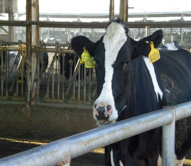
The principals, Mark McDougal and David Condie are well educated, experienced, and motivated. They possess the requisite skills and experience to make this farm, processing facility, and exporting operation successful and profitable. They are both fully vested in their commitment to the farm, hay processing business, and exporting business, as is seen by their past commitment to the company.
The Farm is ideally situated near an Interstate freeway and close to railroad access. The infrastructure is all in place to continue to grow, with excess capacity at the processing facility. The markets which are served by the company are strong and growing. The demand is growing worldwide for quality feeds.









